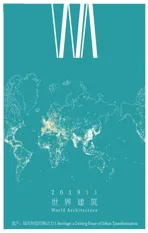世界文化遗产评估标准
2019-11-26UNESCO,WHC
(i)作为人类天才的创造力的杰作;
(ii)在一段时期内或世界某一文化区域内人类价值观的重要交流,对建筑、技术、古迹艺术、城镇规划或景观设计的发展产生重大影响;
(iii)能为延续至今或业已消逝的文明或文化传统提供独特的或至少是特殊的见证;
(iv)是一种建筑、建筑或技术整体、或景观的杰出范例,展现人类历史上一个(或几个)重要阶段;
(v)是传统人类居住地、土地使用或海洋开发的杰出范例,代表一种(或几种)文化或人类与环境的相互作用,特别是当它面临不可逆变化的影响而变得脆弱;
(vi)与具有突出的普遍意义的事件、活传统、观点、信仰、艺术或文学作品有直接或有形的联系。(委员会认为本标准最好与其它标准一起使用。)□(文献来源:联合国教育、科学及文化组织, 保护世界文化与自然遗产政府间委员会, 世界遗产中心. 中国古迹遗址保护协会 译. 实施《世界遗产公约》操作指南, 2017: 16-17.)
(i) to represent a masterpiece of human creative genius;
(ii) to exhibit an important interchange of human values, over a span of time or within a cultural area of the world, on developments in architecture or technology, monumental arts, townplanning or landscape design;
(iii) to bear a unique or at least exceptional testimony to a cultural tradition or to a civilisation which is living or which has disappeared;
(iv) to be an outstanding example of a type of building, architectural or technological ensemble or landscape which illustrates (a) significant stage(s) in human history;
(v) to be an outstanding example of a traditional human settlement, land-use, or sea-use which is representative of a culture (or cultures), or human interaction with the environment especially when it has become vulnerable under the impact of irreversible change;
(vi) to be directly or tangibly associated with events or living traditions, with ideas, or with beliefs, with artistic and literary works of outstanding universal significance. (The Committee considers that this criterion should preferably be used in conjunction with other criteria.)□(Sources: UNESCO/WHC, Operational Guidelines for the Implementation of the World Heritage Convention, 2017.)

1 良渚古城遗址鸟瞰(图片来源:为杭州良渚遗址管理区管理委员会所有,由中国建筑设计研究院建筑历史研究所提供)
